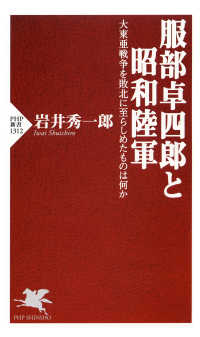- ホーム
- > 洋書
- > 英文書
- > Business / Economics
Full Description
The practice of visiting locations connected to death, calamity, and human suffering—known as "dark tourism"—has become a fascinating but contentious area of research. Bringing together top academics and specialists from across the globe, The Emerald Handbook of International Dark Tourism provides a thorough and multidisciplinary investigation of this phenomena.
This handbook offers new perspectives on the changing role of dark tourism in modern society, drawing on contributions from a variety of academic fields, such as sociology, history, tourist studies, heritage, psychology, religious studies and cultural geography. Chapters address issues like black magic, impact of dark tourism on mental health, dark events, ethical dimensions, technology advancements for dark tourism, commodification of tragedy and many more; that is vital tool for academics, decision-makers, and business professionals.
The Emerald Handbook of International Dark Tourism is a vital resource for understanding the shades of how and why people visit places of death, grief, war and disaster and what this reveals about society's relationship with history, memory and ethics by striking a balance between academic rigour and practical relevance.
Contents
Chapter 1. Conceptualization of the Darkest Events in Human History from the Tourism Perspective; Prajapati Hemant Triloki Prasad and Hardik Bharatbhai Bhadeshiya
Chapter 2. Dark Tourism Management and Development: An Exploratory Analysis; Marco Martins, Ricardo Jorge da Costa Guerra, Lara Santos, Luísa Lopes, and Ana Rita Conde
Chapter 3. Dark and Deep: Mapping Psycho-Somatic Decision-Triggers for Visits in Trauma-Evoking Places through Bibliometric Analysis and TCCM Framework; Arup Kumar Baksi and Subhashree Sanyal
Chapter 4. Dark Tourism: Exploring the Motivation, Impact and Ethical Considerations; Pankaj Kumar Tripathi and Jahanvi Bansal
Chapter 5. Redefining Travel: Sustainable Practices, Experiential Journeys and Dark Tourism; Muhammad Idrees ul Islam, Mubashir Majid Baba, Ashfaq Ahmad, and Syed Immamul Ansarullah
Chapter 6. Dark Tourism Elements in Bangladesh Liberation War: Exploring the Aftermath Effects on Community Development; Mokhlesur Rahman and Naznin Sultana
Chapter 7. Dark Literary Tourism Routes: Footprints of Türk'ün Ateşle İmtihanı Novel; Aslı Bendenay Çapa Daşkın and Semra Günay
Chapter 8. Ethical Dimensions of Dark Tourism: A Conceptual Investigation; Swati Goswami and Abhishek Kumar Pandey
Chapter 9. Unveiling the Shadows: Exploring the Untapped Potential of Dark Tourism in Portugal; Anabela Monteiro
Chapter 10. Dark Tourism Development in Specific Destinations: The Role of Government and Community in Developing Dark Sites in Iraq Cases from Kurdistan Region; Rukhsar Ramadhan Ahmed, Aram Jalal Hassan, and Abdullah Omar Yassen
Chapter 11. Policy Framework for Dark Tourism in India: Addressing Ethical, Cultural, Economic, and Psychological Perspectives; Neha Bhartiya, Ashu Maharshi, and Neharshi Srivastava
Chapter 12. Analysis of Tourism Practices and Experiences in the Ruins of Armero; Jorge Alexander Mora Forero
Chapter 13. Commodification of Tragedy or Educational Tool?: Rethinking Dark Tourism Through a Bibliometric Lens; Manpreet Arora
Chapter 14. Technology Advancements in Dark Tourism; Ihtisham Ullah, Kashif Hussain, Ravindra Kumar Perumal, and Muhammad Tahir Jan
Chapter 15. Dark Attractions and Digital Narratives: Enhancing Visitor Engagement through Technology; Jeetesh Kumar and Gayatri Panda
Chapter 16. From Fun to Fears: Exploring Diverse Dimensions of Dark Tourism; Hare Krishna Chaudhary and Swati Sharma
Chapter 17. Black Magic and Dark Tourism Impact Mental Wellbeing of Gender: A Standpoint of Embodiment Theory with Emotional Experience; Nazirullah, Jan Alam, Mohammad Shahadat Hossen, Irfan Nawaz, Sabeeha Rahman, and Asif Mahmood
Chapter 18. Dark Tourism as a Revival Strategy for Tsunami-Affected Sites in Hikkaduwa, Sri Lanka; Madura Thivanka Pathirana, Upuli Sachithra Warnakula, and Thilini Vimukthika Kelaniyage
Chapter 19. Developing Dark Tourism in Iraq: Its Economic Implications Align with SDG8; Paiman Ahmad
Chapter 20. Storytelling in Dark Tourism Destination Promotion: A Struggle to Build a Unique Image out of Varied and Contradictory Narratives; Samik Ray
Chapter 21. Fascination with Darkness: What Motivates Tourists to Visit Sites of Tragedy and Remembrance - Case Study of Lidice Memorial; Alžbeta Kiráľová and Radka Šperková
Chapter 22. Narratives of the Past: The Contribution of Local Community's Storytelling Practices in Transforming Society's Perspectives on Dark Heritage Tourism Sites; Anila Thomas
Chapter 23. Benefits of Dark Tourism; Ihtisham Ullah, Kashif Hussain, Ravindra Kumar Perumal, and Muhammad Tahir Jan
Chapter 24. The Holocaust Memorial and Upsides of Dark Tourism in the Modern Times; Farhad Nazir and Hassan Ali
Chapter 25. How Does Virtual Dark Tourism Affect the Mental Health of Youth? A Narrative Inquiry; Neharshi Srivastava, Jai Sonker and Kunga Tenzing Wangyal
Chapter 26. Exploring Ethical Concerns in Dark Tourism: Global Case Studies and Their Impact; Malavika Bora
Chapter 27. Dark Tourism as a Tool for Economic Upliftment in Rural Uttarakhand; U. N. Shukla and Tarun Kumar Rana







